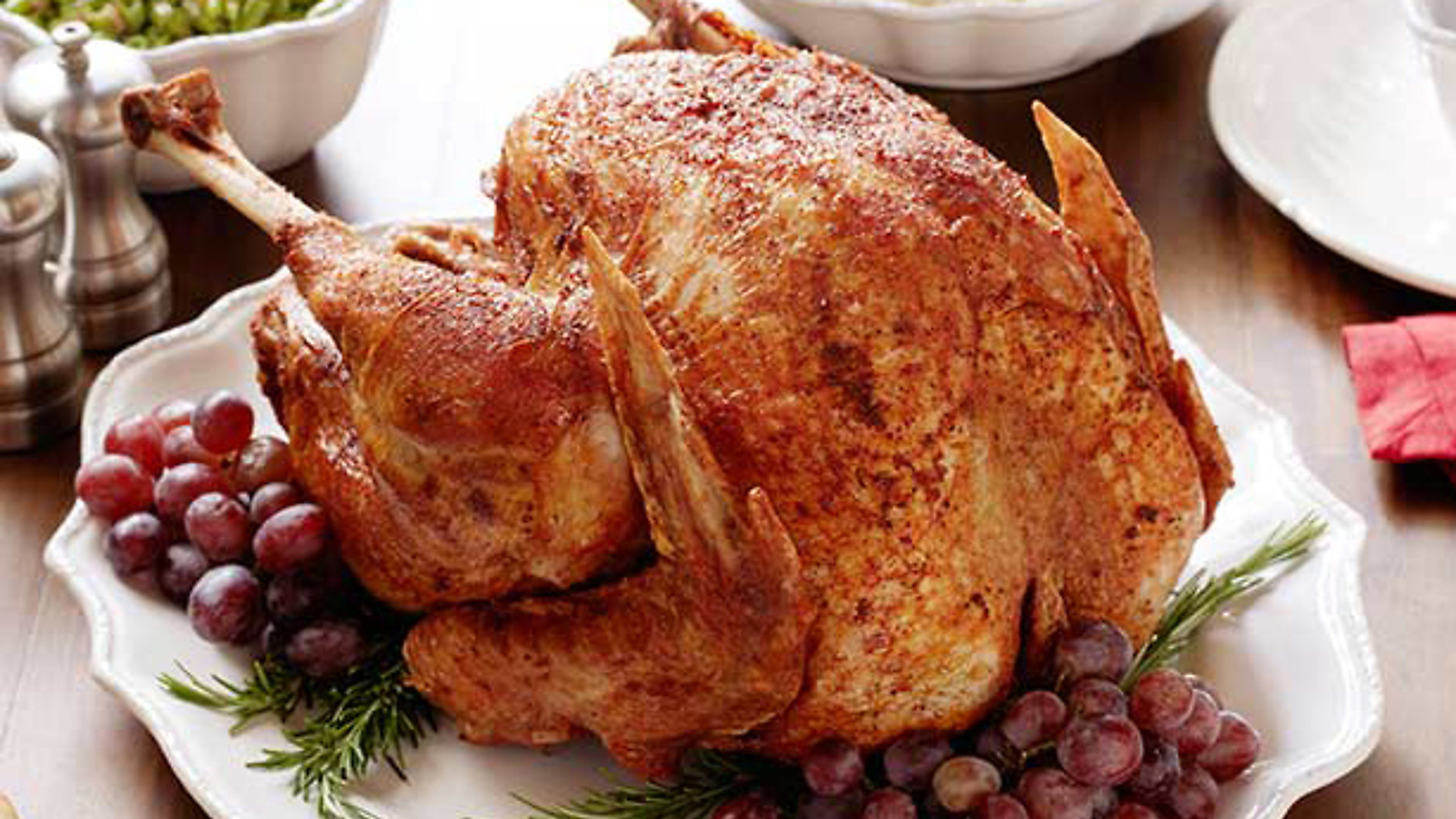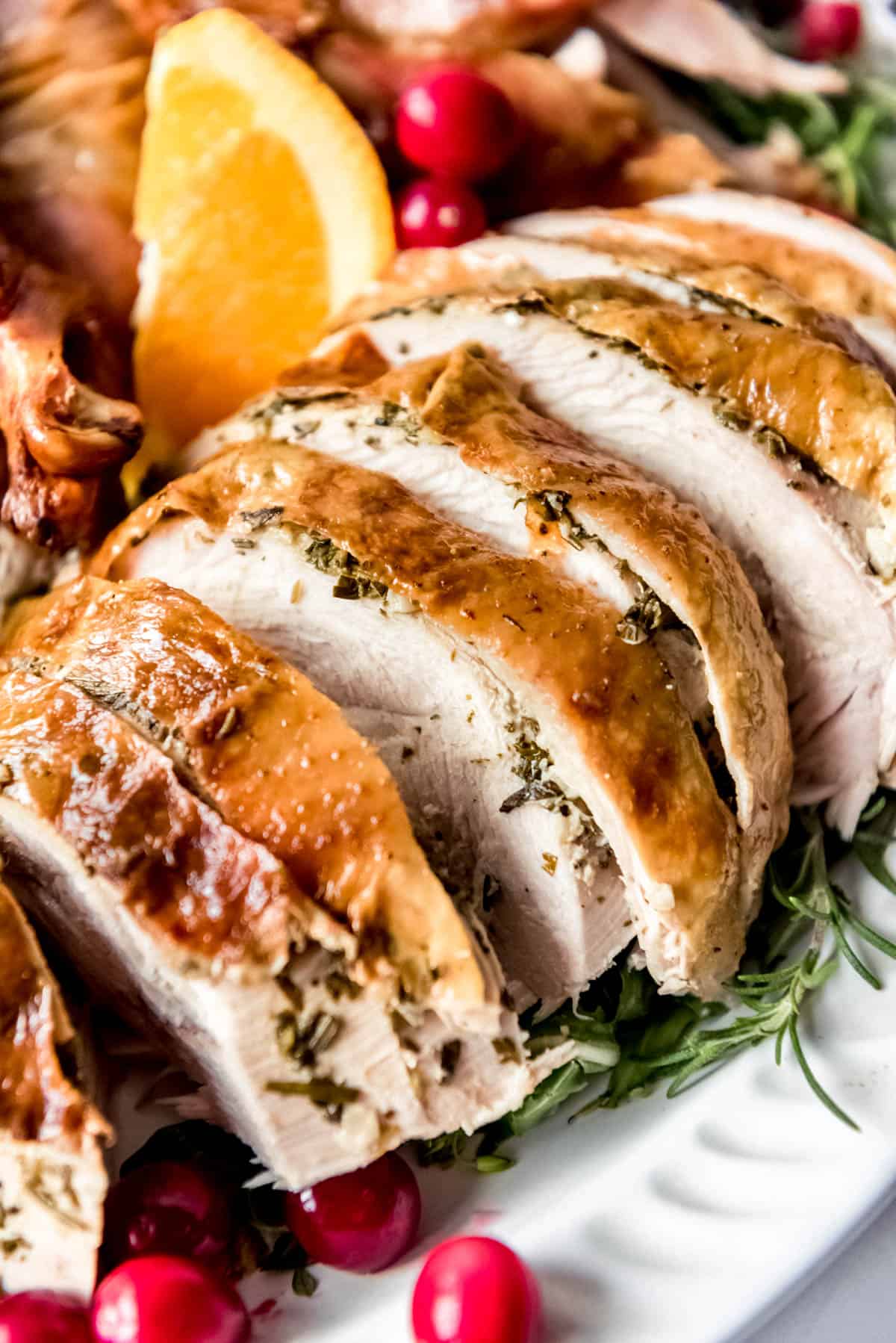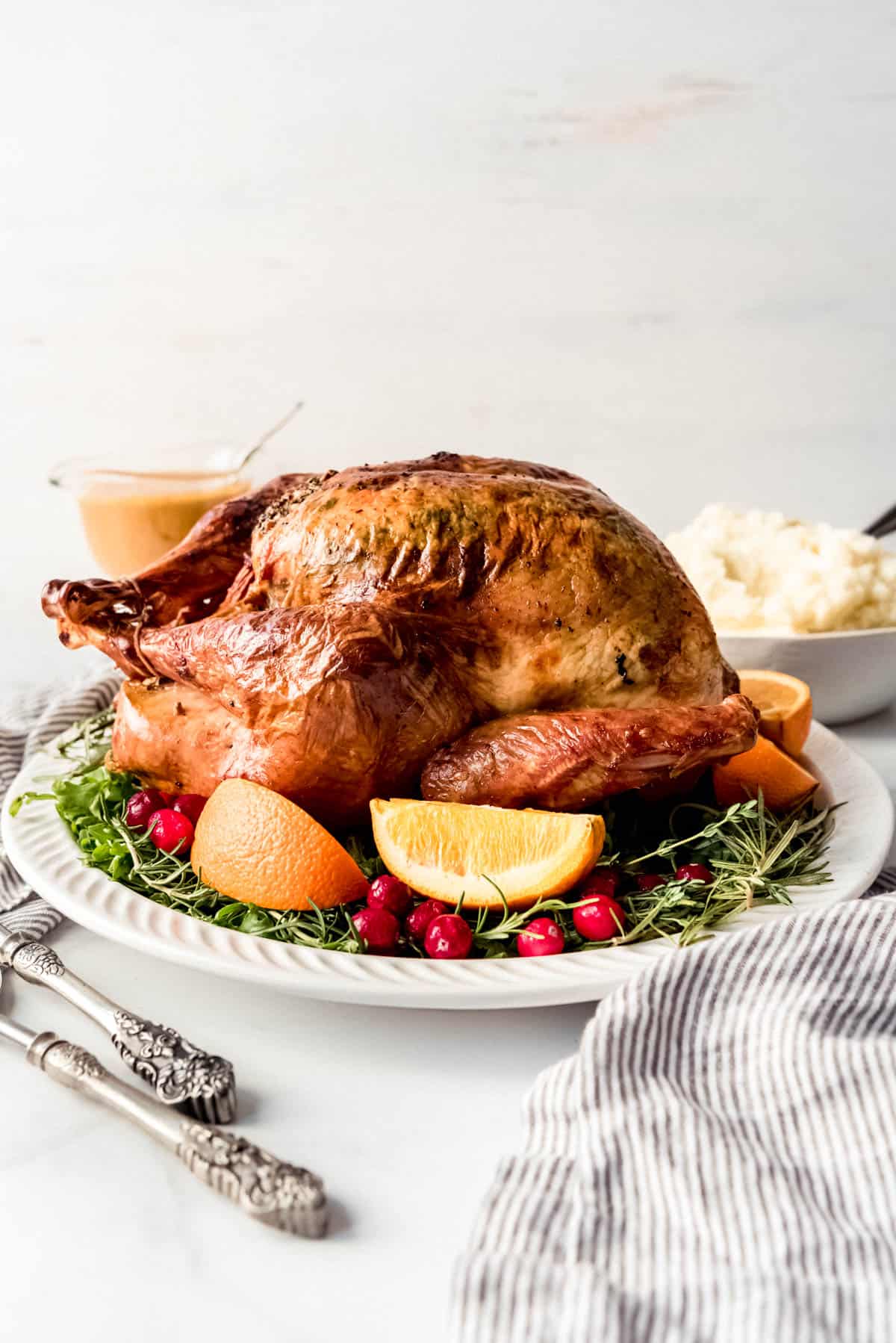A great Turkey Brine Recipe is the difference between a good Thanksgiving turkey and a great one that people will be talking about for years to come. Knowing how to brine a turkey will make a huge difference in your bird whether you plan to roast it, smoke it, or deep-fry it! This quick and easy technique will ensure a deliciously juicy, moist turkey every time!
Whether you are planning a big holiday meal or just serving a special Sunday supper, we’ve got you covered with all the sides you love with a classic turkey dinner, including my favorite turkey gravy. Be sure to check out our collection of the Best Thanksgiving Recipes to see them all!
Fried turkey is the star of many Thanksgiving tables. The crispy juicy bird is a favorite for good reason – when done properly deep-fried turkey is moist, tender and delicious. But achieving fried turkey perfection requires a few key steps. One of the most important is brining.
Brining is the process of soaking meat in a flavored saltwater solution prior to cooking. While you can fry an unbrined turkey, brining helps ensure the best possible flavor and texture. The brine infuses the meat with seasoning while also keeping it incredibly juicy
So if you want the crispiest, most flavorful fried turkey, brining is a must. Read on to learn all about brining turkey for frying, from why it works so well to step-by-step instructions.
Why Brine Turkey Before Frying?
Brining turkey before tossing it in the deep fryer offers several advantages:
It Keeps the Meat Juicy and Moist
One of the biggest risks of deep-fried turkey is ending up with dry, overcooked meat. The high heat of the oil can quickly dry out the lean turkey breast. But brining helps prevent this, allowing you to achieve a perfectly cooked bird that’s juicy throughout.
When turkey is soaked in a brine, the salt and water get absorbed deep into the meat. This helps retain moisture, so even after frying at high temperatures, the turkey stays tender and succulent.
It Adds Flavor to the Meat
A basic brine is simply water and salt. But most brine recipes also include lots of aromatic ingredients like herbs, spices, citrus and more. As the turkey soaks, these flavors infuse into the meat, seasoning it from the inside out.
The result is a turkey bursting with flavor in every bite, not just the surface seasoning.
It Helps Achieve Crispy Skin
For the ultimate fried turkey, you want ultra-crispy, crackling skin. Brining helps obtain this crispy exterior in a couple ways.
First, it removes some moisture from the skin’s surface, allowing it to get crisper in the hot oil. Second, the salt in the brine seasons the skin, enhancing browning and crispiness.
It Allows for Even Cooking
Brining also aids in even cooking, ensuring no part of the turkey is under or overdone. The salt helps denature the proteins, allowing them to cook more uniformly. And the added moisture prevents parts like the breast or wings from drying out too quickly.
Overall, brining leads to a turkey cooked to perfection from surface to center.
How Long to Brine a Turkey for Frying
For best results, turkey should be brined for approximately 1 hour per pound. The general guidelines are:
- 8-12 pound turkey: brine 8 to 12 hours
- 12-16 pound turkey: brine 12 to 16 hours
- 16-20 pound turkey: brine 16 to 20 hours
These times allow the brine to fully penetrate the meat for comprehensive seasoning and tenderness. If you brine for much less time, the effects will only reach the outer areas of the turkey.
It’s best to plan ahead and start brining 1-2 days before frying. Keep the turkey refrigerated at 40°F or below while brining.
How to Brine a Turkey for Frying – Step-By-Step
Brining a turkey for deep frying takes some advance preparation but follows a very straightforward process.
Ingredients Needed
- 1 gallon water
- 1/2 cup kosher salt
- 1/2 cup brown sugar
- Herbs and spices like garlic, pepper, thyme, rosemary etc.
- Juice and zest of 1 lemon and 1 orange
- 4-5 sprigs fresh herbs like thyme, rosemary, sage
Directions
-
Make the brine: In a large pot, combine the water, salt, brown sugar and any other seasoning ingredients. Stir well until salt and sugar fully dissolve.
-
Cool the brine: Allow the brine to fully cool to room temperature, then refrigerate until completely chilled.
-
Submerge the turkey: Place the thoroughly thawed and patted dry turkey in a large container. Pour the chilled brine over to cover. Use a plate to weigh down turkey if needed.
-
Refrigerate: Cover and refrigerate for 8-20 hours depending on turkey size, flipping halfway through. Maintain temperature at or below 40°F.
-
Remove turkey: Take turkey out of the brine and pat dry with paper towels inside and out. Discard used brine.
-
Fry turkey: Follow your favorite fried turkey method, maintaining oil at 350-375°F. Fry approximately 3-4 minutes per pound, until 165°F internal temperature.
And that’s all it takes for a deliciously brined fried turkey! The simple process infuses flavor and guarantees ideal texture.
Top Tips for Brining Fried Turkey
Keep these tips in mind for fail-proof brining and frying:
- Use a large enough container to fully submerge the turkey in brine. Coolers work great.
- Weigh down the turkey if needed to keep fully immersed in brine.
- Stir the brine occasionally to distribute flavors and seasoning.
- Rinse the turkey under cool water after brining before patting dry. This removes any sticky residue.
- Pat the turkey super dry after brining. Any moisture can cause splatter.
- Slowly lower the turkey into the hot oil to prevent splashing.
- Maintain oil temperature at 350-375°F for even cooking.
- Fry 3-4 minutes per pound until 165°F internal temp.
Common Brine Ingredients
While water and salt are the brine basics, you can get creative with herbs, spices, fruits and more. Some top turkey brining ingredients include:
- Lemon/orange juice and zest – Adds bright flavor
- Brown sugar or maple syrup – Enhances browning
- Garlic, onion, shallots – Provides savory aromatics
- Pepper, thyme, rosemary, sage – Classic seasoning
- Cinnamon, allspice – Warm spices pair great with turkey
- Apple, cranberries – Fruity flavors complement turkey
Combine your favorites for a unique turkey brine recipe. get inspired by some classic brine recipes below.
Brined Fried Turkey Inspiration
These recipes use brining to guarantee a perfectly fried turkey:
- Rosemary Garlic Fried Turkey – Herb-infused brine
- Cranberry Brined Fried Turkey – Sweet and tart flavor
- Cajun Deep Fried Turkey – Spicy Creole brine
- Maple Bourbon Brined Fried Turkey – Sweet with a kick
So don’t fry your turkey before brining it first! The simple process guarantees the crispiest skin, juiciest meat and crave-worthy flavor. Use the guide above for fried turkey perfection this Thanksgiving and beyond.

The BEST Turkey Brine
We have been brining our Thanksgiving turkeys for YEARS now and have learned the it is the key to turkey that is tender and juicy. It doesn’t matter how you plan to cook your turkey (and we’ve tried it every possible way from roasting to deep-frying to smoking a turkey), a good soak in a turkey brine makes your bird better every time. And this is the best turkey brine recipe you’ll ever find!
We’re talking eyes-rolling-back-in-your-head type good. More succulent, tender bites of meat whether you prefer light or dark meat. And of course crispier skin with better flavoring. This brine works like a charm and we absolutely swear by it when it comes to making the best turkey ever for your Thanksgiving dinner!
Best of all, it takes just minutes to prepare this Thanksgiving turkey brine recipe! Then your turkey sits in its briny bath for 12-24 hours until you are ready to pull it out and cook it. In the meantime, you can work on other make-ahead items on your Thanksgiving menu so there is less to do on the big day!

How to make Turkey Brine
- Mix the water, salt, and sugar together until the salt and sugar dissolves. I recommend heating 4 cups of water on the stove with the salt and sugar for 10 minutes or so since that helps them dissolve more easily, then adding the rest of the water later. But I have also done it where you just stir them into the cold water and they will eventually dissolve without heat as well. Add all of the remaining brine ingredients (including the remaining cold water or enough ice to cool the brine if you chose to heat it to dissolve the salt and sugar), then stir.
- Prep the turkey by removing neck, gizzards, and any plastic packaging and sticking it in your brine container. I don’t recommend rinsing the turkey before adding it to the brine. Place the turkey breast side down in your brining container. (I know the pictures in this post show the turkey breast up in the brine, but that was totally just a vanity move and I flipped it over before sticking it in the fridge.)
- Cover the turkey with the brine. Carefully pour the brine over the turkey, making sure the entire bird is completely submerged in the liquid. This brine recipe makes enough to easily cover a 12-pound turkey, but you might want to do 1 ½ times the recipe if using a larger bird. Cover the container and transfer to the fridge, if you have room. If not, you can use a bag of ice poured over the top of the turkey brine to keep it safe and cold overnight.
- Dry really well before cooking. After brining, remove the turkey to a large roasting pan or baking sheet and pat the turkey completely dry, both inside and out with lots of paper towels. I do not rinse my turkey after removing it from the turkey brine and have never found it to be too salty. Let it air-dry uncovered in the fridge for a bit, if you have the time. This helps give you crispy skin when you roast the turkey. Even just 30 minutes helps, although if you plan far enough ahead, you could even let it air-dry in the fridge overnight and then cook the turkey the next day.

How to Brine a Turkey
FAQ
Should you brine a turkey before deep frying?
How to prep a turkey for frying?
Is wet brine better than dry brine for fried turkey?
Is it good to brine a turkey before cooking?
How do you brine a Turkey?
To brine a turkey, you will need: 1. Prepare the turkey. Rinse the turkey inside and out with cold water. Remove the giblets and neck from the cavity. Pat the turkey dry with paper towels. 2. Make the brine solution. In a large container, combine 1 gallon of water, 1 cup of salt, and 1/2 cup of sugar. Stir until the salt and sugar are dissolved.
How do you brine a Turkey to deep fry?
So if you’re ready to learn how to brine a turkey to deep fry, read on! Dissolve salt in 1 gallon of water. Add brown sugar to brine. Add peppercorns to brine. Add whole cloves to brine. Add bay leaves to brine. Submerge turkey in brine, cover, and refrigerate for 24 hours. What is brining?
How do you Dry a Turkey before frying?
After unwrapping, pat the turkey very dry with paper towels inside and out. Season the turkey with kosher salt and then let it absorb the salt for at least 24 hours in the fridge. If space allows, leave the turkey uncovered, which helps dry the turkey even further. Pat the turkey dry again just before frying.
Why should you brine a Turkey before deep frying?
The salt in the brine helps to break down the proteins in the meat, making it more tender. The sugar in the brine helps to caramelize the skin and give it a crispy texture. Brining also helps to keep the turkey from drying out during cooking. If you are planning on deep frying a turkey, be sure to brine it first for the best results.
